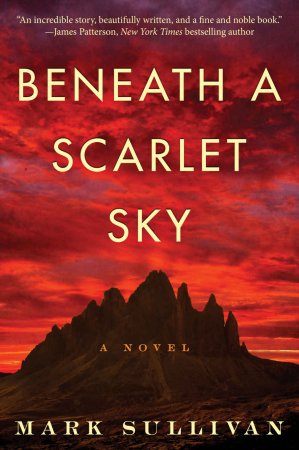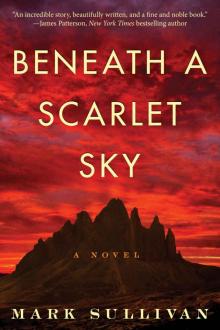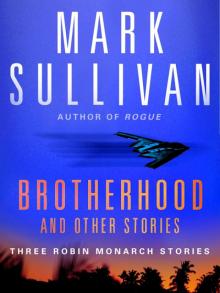- Home
- Mark Sullivan
Brotherhood and Others Page 12
Brotherhood and Others Read online
Page 12
He looked at Gahji and nodded.
The boy soldier got up, and went inside the plantation house. Not long after, he returned with six armed boy soldiers. Gahji carried a finely-carved wooden box about the size of a toaster, and set it before Lieutenant Zed, who smiled, said, “And now what you have traveled so far to see.”
He lifted the lid, set it on the table beside him before removing a heavy object wrapped in black cloth. Putting it on the table, he unwrapped the bundle and turned over the last piece of fabric.
Gasps went up from the three other bidders. Monarch knew next to nothing about diamonds, but there was no doubt that this one was exceptional.
“That’s not possible!” Chatterjee cried.
Sing jumped up so fast to see the gem better that he knocked over his chair. Bergenheim just sat there, transfixed by the jewel.
“What is the weight?” Sing asked.
Lieutenant Zed smiled, knowing he had a captive audience now. “We await your tests, but we’ve measured it at seven thousand carats.”
“Seven thousand!” Chatterjee marveled. “The Cullinan was what in rough?”
“3,106.75 carats,” Bergenheim mumbled. “532.2 carats cut
“Cut?” Sing said. “What would you cut? It’s like God did the job already!”
It was true. The crystal was shaped less like a conventional gem than an eight-sided translucent sculpture of a giant’s teardrop or a dinosaur’s egg. The more Monarch looked at the stone the more he was mesmerized by it.
Lieutenant Zed said, “Mr. Monarch?”
“Absolutely beautiful,” Monarch said, using the camera in his knapsack to take pictures.
“More beautiful than any woman,” the rebel leader boasted. “Why do you think I sleep with it?”
They examined the stone over the course of the next hour. Sing weighed it at 7,002.2 carats. Chatterjee tested it for thermal conductivity and found it astonishingly high. Despite physical distress that had him disappearing to the outhouse three times, Bergenheim donned loupes on both eyes and pored over the natural facets from all sides while shining a high-intensity light through it and measuring it with a portable spectrometer.
“I’m finding no lattice defects, and zero impurities,” he said in disbelief.
“No boron?” Sing asked. “No nitrogen at all?”
“Zero,” Bergenheim replied. “It has the highest refractive index I’ve ever seen and the facet edges are as sharp as the best-cut jewels anywhere on earth. The luster is just extraordinary.”
“Mohs scale?” Chatterjee asked.
Bergenheim looked like he’d been slapped. “Are you mad? No one would dare run a sclerometer across something like this.”
Lieutenant Zed said, “So you agree that it is flawless?”
“Well,” Sing said, “the only absolutely positive way to know is to run X-rays through it.”
“Which I can do,” Monarch said, reaching for his case.
“You have an X-ray machine with you?” Bergenheim said, astonished.
“You don’t?” Monarch said, unlocking the case. “This one’s state of the art. But X-rays are X-rays. Lieutenant, unless you have a lead shield handy, you and your boys should probably back off in case the diamond throws the rays wild.”
Lieutenant Zed grimaced, but then barked something in that Congolese dialect at the armed boys. They all moved off the veranda and into the yard behind the plantation house. Fasi followed them, stood off to one side. The three other potential bidders did the same, but not before Bergenheim said, “What about you?”
“The case is lead lined,” Monarch replied, and then set up the laptop on the table beside the diamond with the case in front of it.
With a thin cable he attached the nozzle-like camera with the bug-eye lens to the computer. “Ready?” Monarch murmured.
“When you are,” Barnett whispered in his earbud. “And make damn sure you point that thing away from you.”
He clucked with his tongue in agreement, pushed the massive diamond over on its side, and reached around from behind the case to press the bug-eyed lens to the surface of the stone. With his other hand, he hit the return key on the laptop, which caused a split-second hum as X-rays spit out.
Monarch glanced over at the screen, seeing the diamond in black with the lattices exposed as thin white lines.
“They want three more perspectives,” Barnett said.
Monarch clucked and did as she’d asked. When he was finished, he murmured, “Good?”
“More than good,” she said. “They say it’s for real. No detectable flaws whatsoever. Which means you are a go for phase two.”
“Gotta check out the mine first,” Monarch muttered as he disconnected the miniature X-ray camera from the computer.
“What did you find?” Lieutenant Zed was walking back to the veranda.
“Look for yourself,” Monarch said, turning the laptop screen to face the others who were coming back to the veranda. “It’s perfect.”
* * *
“Nothing’s perfect, Robin,” said Claudio after they’d left the rooftop across from the jewelry factory and Julio, who’d gone off in search of Inez. “We’ll just have to deal with him.”
“Julio knows,” Robin said, leading them down an alleyway.
“I don’t think so,” Claudio said.
“We have to assume he does,” Robin insisted. “And act as if he doesn’t.”
The older boy looked pained, and nodded unhappily.
“What’s the matter?” Robin asked.
“Julio,” Claudio said. “He rescued me from the ano, the same way I rescued you from the ano. And this is how I repay him?”
“I have repaid him for four years,” Robin shot back.
“What about me?” Claudio demanded.
“I can never repay you in full. You know that.”
“This is how I feel about Julio sometimes,” Claudio moaned, and then rubbed his head. “Why can’t I just be by myself and paint?”
Robin felt bad, and said, “Maybe we will take enough from the factory to buy you the things you need to be a painter.”
Claudio’s jaw loosened. “You mean like canvases? Easels? Paints. Brushes?”
“Why not? We have no idea what’s really in there, do we? For all we know there could be a king’s ransom.”
* * *
In Monarch’s earbud, Barnett asked, “How are you going to steal it?”
“I haven’t figured that out yet,” he muttered as he followed Lieutenant Zed, Gahji, and the three diamond experts across the canal bridge.
He set his case on the pad by the helicopter with the others, and then followed them toward a wide path that led up the hillside.
“Slattery’s telling me that it’s crucial to national security that we control that diamond,” Barnett said.
Jack Slattery was Monarch’s new boss, an abrasive guy, but smart and well connected within the upper echelons of the agency. Monarch clucked his tongue twice to indicate he understood.
As it had been explained to Monarch, American scientists had been searching for flawless diamonds for years so that they could be used to exponentially increase the power of lasers. Opposing mirrors made of flawless diamond crystals, they theorized, would allow lasers to be developed that would use X-rays instead of light waves as their energy source.
An X-ray-based laser would allow chemists, biologists, and physicists to study all sorts of things at their subatomic level. It could also be used by doctors to pinpoint and kill cancerous cells, and by engineers to create lighter, stronger substances.
“Still think this is about weapons,” Monarch mumbled.
“Slattery says it’s not,” Barnett insisted. “He says no chance of an X-ray—”
“Explain the bidding process,” Sing said.
Monarch realized that as the path grew steeper they’d all slowed down.
“How and when,” said Bergenheim, who was gasping and looking ill.
“The helicopter
will take you back to your vehicles as soon as you see the mine,” Lieutenant Zed replied. “I will give you an e-mail address. You will submit your bids to that e-mail by noon the day after tomorrow. That will give you and the other bidders arriving in the morning time to come up with your best offer.”
“Wait,” Chatterjee said. “What other bidders?”
“Right,” Sing said angrily. “We were led to believe—”
“You were led to believe that there would be an auction,” Lieutenant Zed snapped. “You didn’t honestly think I would limit it to four? The South Africans couldn’t make it here until tomorrow. The same with the British. The two others—from Singapore and France—asked to join late.”
Monarch checked his watch. It was almost five. Sunset would be at six twenty, which meant the pilot would want to fly sooner than later.
“How much farther is the mine?” he asked.
“Ten minutes,” said Gahji.
“I don’t need to see it,” Bergenheim complained. “Just send me the geological reports.”
Lieutenant Zed laughed and walked on, calling over his shoulder, “We don’t have any reports, and no idea how deep the laterite vein goes.”
“What are you talking about?” Chatterjee said. “You dug it, didn’t you?”
The rebel leader shook his head, gestured back across at the plantation house. “Those people, the Coeurs, they started the mine. At one time they had almost one hundred people in here digging. But before the hole started to produce, malaria and dysentery swept through here. Killed them all, and the mine was abandoned.”
“And, what, you just stumbled on it, went in, and found that diamond?” Sing asked, dumbfounded.
“Basically,” Lieutenant Zed agreed. “It was as if God led me to it.”
Monarch noticed Fasi glaring at the ground.
“But who owns the claim?” Bergenheim demanded. “If there was a mine, someone owns the mineral rights to it.”
“We live in the jungle, but we’re not apes,” Lieutenant Zed said calmly. “I bought the rights for fifty dollars two years ago.”
“Fifty dollars,” Chatterjee said, shaking his head. “That diamond is worth … well…”
“Yes, it is,” the rebel leader said, smiling again as they broke from the jungle into a clearing chiseled flat high on the hillside.
Dark tailings had been thrown in heaps down the side of the hill, stripping it of vegetation, exposing the reddish surface soil Monarch had seen from the helicopter pad. The mine entrance looked like a black gash. Filthy, exhausted boys wearing headlamps pushed wheelbarrows laden with fresh ore from the hole. Others picked through the rocks the mine boys dumped, looking for gems.
“They don’t look much like warriors,” Monarch commented.
“Every boy takes his turns up here,” Lieutenant Zed retorted. “They do it eagerly. Isn’t that true, Gahji?”
The boy soldier nodded vigorously. “It is their honor because they know they not only fight for the revolution, they work for the guns they carry.”
But Monarch saw more desperation than pride in the mine boys’ faces. And fear. And shame. Then he noticed that Fasi was regarding the boys with what looked like pity.
He’s basically a slave, but he’s worried about the boys? Monarch thought.
“Whoever wishes to see where it was found may enter now,” said Lieutenant Zed.
In his earbud, Barnett said, “Your call. We won’t get a feed. And we’ve got the GPS coordinates.”
“I’m going in,” said Sing.
“Yes,” Chatterjee said. “It will be cooler inside, right?”
“A lot cooler,” Gahji agreed.
Bergenheim was already moving toward the entrance.
Though Monarch was interested to see the inside of a diamond mine, he said, “I’ll pass, wait at the helicopter.”
“Can’t wait to leave us, Mr. Monarch?” Lieutenant Zed asked.
“Can’t wait to deliver my assessment and bid recommendation to my clients,” Monarch said.
“Go down with him, Gahji.”
* * *
“I’m with you,” Julio said. “Every step of the way.”
Robin wanted to argue with the leader of La Fraternidad, but caught Claudio shaking his head.
“Perfect, my brother,” Robin replied instead. “Part one will go easier.”
It was late on a Friday afternoon in September, blustery and raining in Buenos Aires. They were on the roof across the street, keeping tabs on people entering and exiting the jewelry factory as the weekend approached.
Just as the natural light began to dim, Claudio said, “There they are.”
Robin peeked over the edge of the roof, seeing a van bearing the logo of a cleaning service backing up to the loading dock. A car parked beside it. Two women climbed out. A man in a workman’s jumpsuit exited the van.
The overhead door rolled up. The women and the man climbed onto the loading dock and took cleaning gear from the rear of the van. The overhead door rolled down.
“No security guard at night?” Julio asked.
“They replaced him with a new alarm system,” Claudio explained. “Last employee will leave for the weekend in five minutes. Then it will just be the cleaning crew. The women will leave in two hours. The man, Mr. Mendez, will stay behind ten minutes to inspect and then leave at exactly seven thirty.”
“Every time?” asked Julio, sounding impressed.
“Every time,” Claudio replied.
Two hours later, at precisely seven twenty, the two women came out the service door, lit cigarettes, climbed in their car, and drove off.
Robin, Claudio, and Julio were already in motion.
* * *
The pilot was there, making his inspections. Monarch walked to the shady side of the helicopter. Gahji shadowed him.
Trying to appear at ease, Monarch rested one hand on the helicopter. But he was studying everything, and trying to figure out what he could do to delay the helicopter’s departure.
He thought of that clanking noise in the rotor housing. Could he suggest looking at it and then monkey with it enough to disable the chopper?
Or steal Gahji’s gun and shoot the—?
No way. The bridge to the stockade had been retracted. The gate was closed. There were three or four hundred armed kids inside and he still had no idea where Lieutenant Zed kept the diamond.
Then something dawned on him that just might work. He stood, picked up his instrument case, and set it on the floor of the helicopter bay. He flipped the hasps open, lifted the lid.
“Thought you were scared about the humidity and heat,” Gahji said, watching him suspiciously.
“Just want to make sure my computer backed up the data,” Monarch explained, making a show of removing the computer and attaching the portable X-ray camera.
He acted as if he was paying attention to the recorded images of the diamond’s remarkable architecture. But for the next several minutes, he kept the camera aimed toward the cockpit and triggered burst after burst of X-rays toward the instrument panel.
“The others are coming,” Gahji said.
The pilot opened the cockpit door, climbed in.
“No problem,” Monarch said, detaching the camera, and sliding it and the computer into the case.
Shutting and locking it, hearing Lieutenant Zed’s voice approaching, Monarch wondered whether it had been enough.
The other diamond experts came around the rear of the helicopter.
The pilot cursed.
* * *
“What the hell is—?”
Julio clamped a gloved hand over the mouth of the cleaner at the jewelry factory. Claudio and Robin had stepped out from behind the van wearing hoods when he raised the loading dock door.
Mendez began struggling and making whining noises as Julio dragged him back inside the loading area. Claudio and Robin vaulted inside. Robin killed the lights. Claudio lowered the overhead door. Robin flipped one light back on.
The man had stopped struggling and sat down on the cement floor because Julio had pressed a pistol barrel to his head.
Where had that come from? No one in La Fraternidad carried any weapon other than a knife. Julio used to say that guns were unnecessary and only complicated things if you got caught.
“What’s the alarm code?” Julio demanded from behind his hood.
Mendez looked wild-eyed, said, “Señor Hernandez, he kill me I tell you.”
“I’ll kill you right now, you don’t,” Julio growled.
“Tell us and you’ll come out of this alive,” Robin said, hoping to defuse the situation.
The cleaner sobbed: “4-8-0-2-3-2.”
“How long until it activates?” Claudio asked.
“Thirty seconds you must leave before the doors and windows go alarm.”
“Smart man,” Julio said, taking out a kerchief and using it to gag the cleaner. Robin joined him with rope.
Julio tied his wrists while Robin got his ankles.
Claudio typed in the code, then went to the overhead door, lifted it, and then shut it. He watched a digital panel, saw the word “Armed” flash twice.
“I still think we should just leave the alarm off,” Julio said.
Claudio shook his head. “The alarm company has to be expecting it to be armed right about now. That’s the routine. We don’t want to break it until we’re ready to get out of here.”
Robin thought of something. “What about his van? What if someone comes looking for him?”
“He’s not due home until midnight so we won’t be here long enough for it to matter,” Claudio said.
Julio went around behind Mendez, removed his hood, and turned it backward before lowering it onto the cleaner’s head.
“Sleep,” Claudio said, removing his own hood. “No use fighting it.”
But Mendez’s body remained stiff and alert.
“Let’s move,” Julio said, starting toward the door.
Claudio caught him. “I’ve found that it’s better if our young genius leads.”
Julio thought better of it, but then nodded to Robin, said, “Show us how.”
* * *
First Gahji and then Lieutenant Zed went to the door of the helicopter cockpit. Monarch heard a fierce discussion ensuing.

 Beneath a Scarlet Sky
Beneath a Scarlet Sky The Last Green Valley
The Last Green Valley Beneath a Scarlet Sky: A Novel
Beneath a Scarlet Sky: A Novel Brotherhood and Others
Brotherhood and Others The Purification Ceremony
The Purification Ceremony